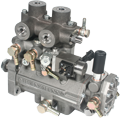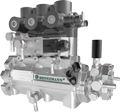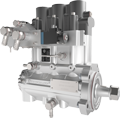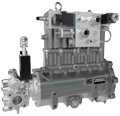Common Rail & EFI
HEINZMANN’s range of common rail includes both high-precision hydraulic key components as well as > EFI controllers.
All components are exclusively developed and manufactured in-house and ensure optimal connectivity and compatibility. Therefore, HEINZMANN solutions for sophisticated common rail technology work towards the fuel efficiency and emission reduction of combustion engines.
High-Pressure Pumps
The HDP-K series features a unique crank mechanism and excels with high efficiency and long endurance.
Their robustness makes them suitable for the demanding needs of industrial environments. Designed to minimize wear effects on pump elements and plungers, HDP-K high-pressure pumps guaranty efficient operation and long TBO periods.
| Product | Description | Applications |
HDP- K2 |
High-pressure pump with 2 pressure elements for system pressures up to 2,200bar.Delivery rates up to 2.5 l/min. Flanged mounted. | Genset Off-highway vehicles |
HDP- K3 |
High-pressure pump with 3 pressure elements for system pressures up to 2,200 bar.Delivery rates up to 15 l/min (1 pump) / redundant concept: up to 30 l/min (2 pumps). Flange or socket mounting. | Genset Marine Rail Traction |
HDP-K3 HFO |
High-pressure pump with 3 pressure elements for system pressures up to 2,200 bar.Delivery rates up to 15 l/min (1 pump) / redundant concept: up to 30 l/min (2 pumps). Designed for heavy fuel oil operation, featuring a special two-way HFO/lube-oil sealing concept, mix oil drain and high-temperature resistant design. |
Marine |
HDP-K4 HFO |
High-pressure pump with 4 pressure elements for system pressures up to 2,400 bar. Delivery rates up to 65 l/min (1 pump) / redundant concet: up to 130 l/min (2 pumps). Designed for heavy fuel oil operation, featuring a special two-way HFO/lube-oil sealing concept, mix oil drain and high-temperature resistant design. |
Genset Marine Rail Traction |
Solenoid-controlled Fuel Injectors
The new ICR-DS fuel injector generation features a static leak free design. Fuel backflow could be reduced by 75% compared to conventional leakage afflicted common rail injector designs. Furthermore, peak pressures inside ICR-DS injectors were diminished by 25% through the integration of an accumulation volume (rail volume). As a result, a smooth fuel flow can be achieved, which is of highest importance especially for heavy fuel oil (HFO) operation.
| Product | Description |
ICR-DS-50 |
Small-sized common rail injector for engines with cylinder power up to 50 kW. Injection pressures up to 2,000 bar, injection quantities from 2 to 200 mm3/shot. Designed for distillate diesel fuels. |
CR-DS-100 |
Medium-sized common rail injector for engines with cylinder powerup to 100 kW. Injection pressures up to 2,200 bar, injection quantities from 10 to 500 mm3/shot. Designed for distillate diesel fuels. |
ICR-DS-200 |
Medium-sized common rail injector for engines with cylinder power up to 200 kW. Injection pressures up to 2,200 bar, injection quantities from 50 to 2,200 mm3/shot. |
ICR-DS-300 |
Large-sized common rail injector for engines with cylinder power up to 300 kW. Injection pressures up to 2,200 bar, injection quantities from 50 to 4,000 mm3/shot. Designed for heavy fuel oil operation. |
ICR-DS-500 |
Large-sized common rail injector for engines with cylinder power up to 500 kW. Injection pressures up to 2,200 bar, injection quantities from 70 to 7,000 mm3/shot. Designed for heavy fuel oil operation. |
ICR-DS-1000 |
Large-sized common rail injector for engines with cylinder power up to 1,250 kW. Injection pressures up to 2,400 bar, injection quantities from 150 to 14,000 mm3/shot. Designed for heavy fuel oil operation. Features:
|
Rail
| Product | Description |
 |
High-pressure accumulator, customised to engine requirements |
Rail Pressure Limiting Valves
| Product | Description |
| RPLV-1S RPLV-2S RPLV-2S-CAR  |
Protection of common rail equipment against overpressure: Fast acting rail pressure limiting valves that perform quick pressure drop.
RPLV-1S: Pressure limitation, temporary safety function only RPLV-2S-CAR: Pressure limitation, followed by pressure drop to holding pressure (limp home mode). |
